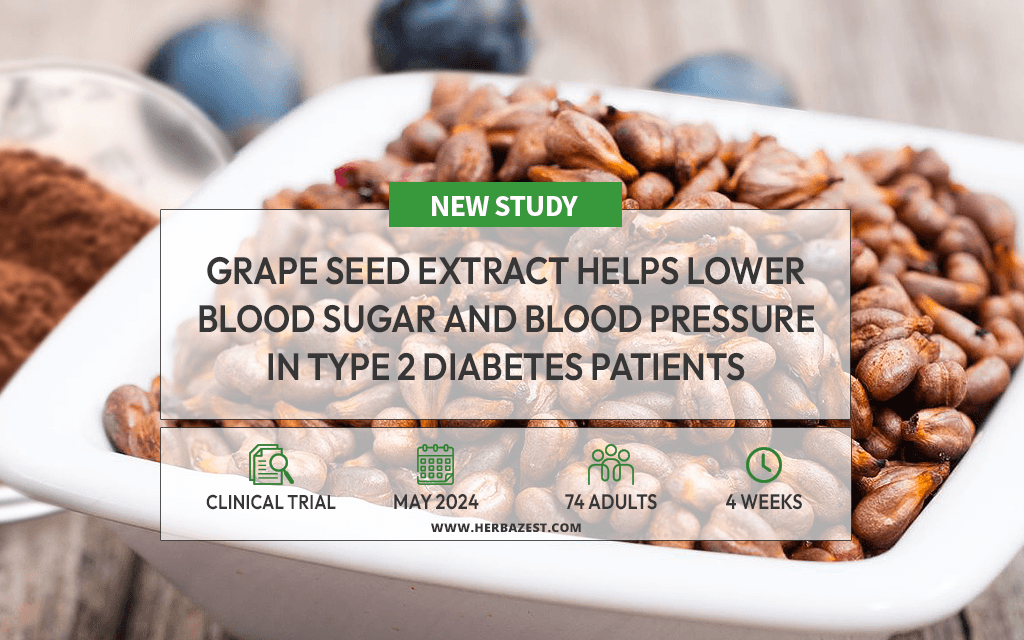Managing blood glucose levels is crucial to preventing complications of type 2 diabetes, including cardiovascular disease, neuropathy, and kidney failure. In the search for natural remedies to complement conventional treatments, grapes have garnered attention due to their bioactive compounds, such as proanthocyanidins, which are believed to offer various health benefits, including antioxidant and anti-inflammatory effects.1 A 2024 clinical trial investigated the impact of grape seed extract on patients with type 2 diabetes.
The Study
The study involved 74 patients with type 2 diabetes, who were randomly divided into two groups. The treatment group received 263.2 mg of grape seed extract standardized to contain 250 mg of proanthocyanidins, taken twice daily. The placebo group received an identical-looking capsule without the active ingredient. Both groups maintained their usual diet and exercise routines throughout the 30-day trial.
The primary objective of the researchers was to determine whether grape seed extract could serve as a natural, effective supplement to existing diabetes management strategies by improving metabolic health markers, including fasting blood sugar, lipid profile, and blood pressure.
The Results
After the 30-day intervention, the study found statistically significant improvements in some key health parameters among patients in the treatment group compared to those in the placebo group.
Notably, the fasting blood sugar levels in the treatment group decreased from an average of 144.75 mg/dL to 129.87 mg/dL, representing a significant reduction compared to the placebo group, which showed no notable change. Additionally, systolic blood pressure was significantly reduced in the treatment group, whereas no significant changes were observed in the placebo group.
The study found no significant changes in the lipid profile or diastolic blood pressure between the two groups. These findings suggest that while grape seed extract may effectively lower blood sugar levels and systolic blood pressure, its impact on other cardiovascular risk factors and lipid metabolism may be limited over a short duration of 30 days.
What Does this Mean?
The results of this clinical trial indicate that grape seed extract may be beneficial for diabetes management, particularly in improving fasting blood sugar levels and systolic blood pressure.
The authors suggest that the reduction in blood sugar levels is due to the high proanthocyanidin content in grapes. These antioxidant compounds might enhance insulin sensitivity and reduce oxidative stress, which are critical factors in managing diabetes.
Furthermore, high blood pressure is a common comorbidity in diabetic patients, often exacerbating the risk of cardiovascular complications. By helping to lower systolic blood pressure, grape seed extract could help address these issues.
While further research is needed to explore the long-term benefits of grape seed extract for diabetes, this study provides promising evidence that it may offer a natural, complementary approach to managing the disease.
Other herbs that may offer diabetes-friendly benefits include stevia, sunflower, yacon, and beans.
Sources
- Jundishapur Journal of Natural Pharmaceutical Products, A 4-week Randomized, Double-Blind, Placebo-Controlled Clinical Trial on the Use of Grape Seed Extract for Reducing Plasma Glucose, Lipid Profile, and Blood Pressure in Patients with Type 2 Diabetes Mellitus, 2024
Footnotes:
- Journal of Functional Foods. (2020). Proanthocyanidins in grape seeds: An updated review of their health benefits and potential uses in the food industry. Retrieved September 2, 2024, from https://www.sciencedirect.com/science/article/pii/S1756464620300852




